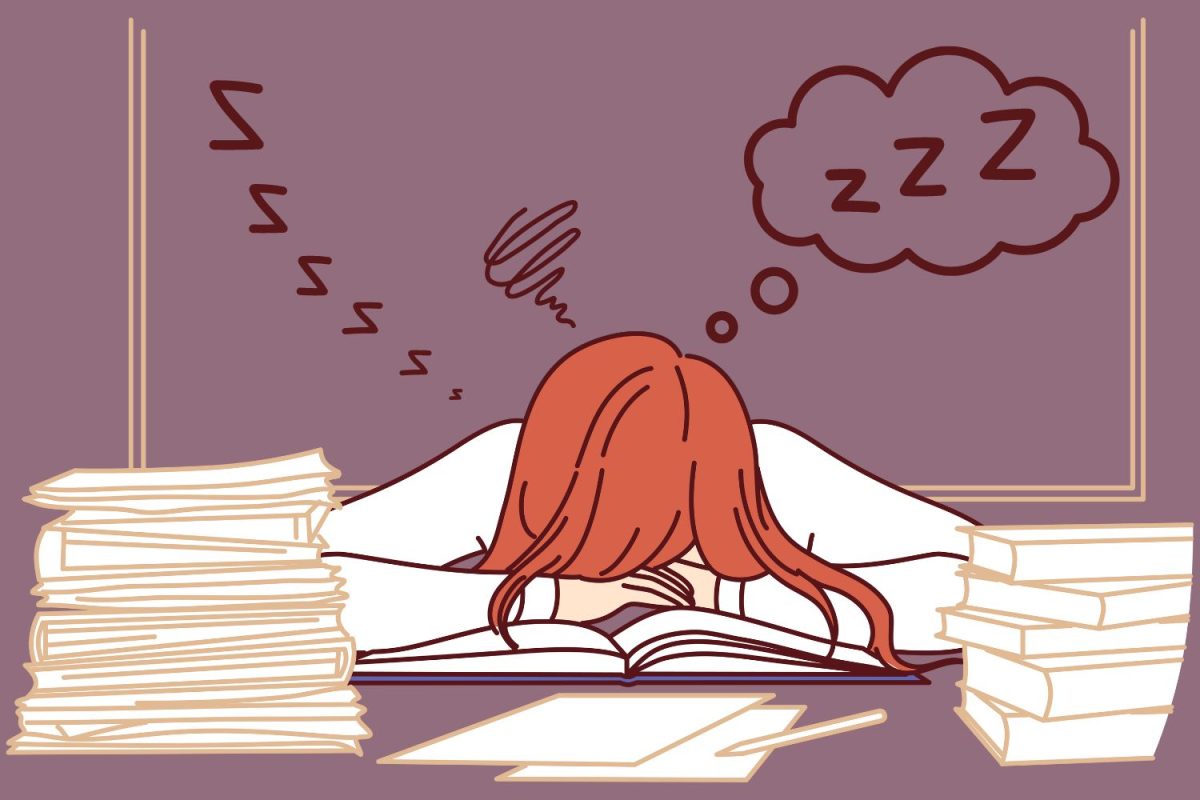Near the casino’s cash machine, a man waits anxiously for the clock to strike midnight and the maximum withdrawal on his bank account to reset; the atmosphere is mature and daunting. Yet Saltzgaber trusts himself enough to resist temptation, to circumvent the risks and play poker for what it is: A card game.
Though resolute, Saltzgaber too sometimes wavers: The temptation to never stop, to keep gambling through the night, is one he has felt. He believes that, for those who gamble in any capacity, the lure of the cards is vivid. It’s a feeling you get, he said, which “works both ways. If you win a lot you feel hot and you want to keep playing, and if you lose a lot you think you can make the money back.”
The risk, however, is evident for Saltzgaber. “It’s not for everyone, either because they’re not good [at the game], or they get hooked or they don’t know when to stop,” he said.
First-hand, he has seen the way gambling can exploit individuals with a weaker resolve. “[A relation of mine] doesn’t play anymore because she got, not hooked, but she was playing and didn’t know when to quit so she lost more money than she wanted to,” he said. Saltzgaber feels confident he could make the same decision if the situation begged so.
Both in online poker tournaments and at the casino tables themselves, Saltzgaber holds himself to one rule to make sure temptation is never fulfilled: “I never put in anything that I’m not willing to lose,” he said.
And, if the urge ever reaches a certain point, he will not hesitate to walk away. “In the case of, ‘oh, I won a lot of money last night, I want to play again,’ it becomes about the money and that’s not really what I want it to be about,” he said. Poker, for Saltzgaber is simply about the game, pure and simple. The strategy – the bluffs, the bets, reading his opponents – this is what he loves. For some however, it is the money, not the game that drives their interest.
| “W |
hen we play poker, it’s really chill at first,” Blake*, an underclassman, said.
It’s a Saturday night and there’s not much to do for Blake and his friends, so, as they’ve become used to, the six or seven of them play a game of poker. Not long ago some of their friends acquired amateur poker tables for their homes, an addition to chase away their boredom with the sometimes sweet, sometimes bitter lure of cards.
The game begins with a £50 buy-in, the usual bet for a weekend “winner takes all” game of poker.
Blake and his friends have been playing poker for more than a year now, though he insists that it is not what brought them together in the first place. “At first our group of friends were just guys who didn’t really meld with the others. And only then did we start doing the betting and putting big money,” Oscar*, one of Blake’s friends, said.
In fact, Oscar continued, the boys share similar hobbies and interests outside of betting and were introduced to the realm of gambling by another friend. This friend happened to introduce poker, and ultimately other forms of gambling, such as sports betting, after seeing relatives and acquaintances from outside of school participating in such entertainment.
Over time, however, even though Oscar, Blake and their friends do not seek to exclude anyone, it has becomes a sort of differentiating factor between their group and other students. “The people who don’t play with us just want to do other things, or they live in different areas than us – it’s not [that they don’t hang out with us] directly because of our hobbies,” Oscar said.
As the night develops, the number of players at the table dwindles and the bets and blinds swell. This is “when it gets heated,” according to Blake. On this particular night, Blake is facing off with one of his friends: The last two standing. The table has been stagnant, neither opponent faithful enough to trust the cards he’s holding.
Then the lucky hand comes out. Blake goes all in. His friend (and current opponent), perhaps because of bluff, intimidation or sheer abandon, matches him. The tension is palpable at the table, where all of Blake and Oscar’s friends watch patiently and respectfully.
Blake shows a full house while his opponent, throwing a meager pair on the table, begins shouting. According to him, Blake has cheated. He throws the cards and chips together, frantically waving his arms across the table – even though it’s obvious who the winner is, the bet doesn’t materialize and no one wins the money.
“Sometimes it just gets really heated,” Oscar said.
The poker table, though sometimes physical, is often lighthearted fun for Blake, Oscar and their friends; where tempers really flare and the bets foray into the triple, and sometimes quadruple figures, is in the video game FIFA. The game itself is quite entertaining for Blake, but the thrill of thrashing a friend at a video game doesn’t offer the same thrill as a bet of, say, £2,000 might.
“Really, I bet on anything. I don’t care what it is [we’re wagering on], even if it’s a race around the house, as long as there is money involved. If there’s money, there’s more excitement; what’s the point if you don’t have money on the line?” Blake said.
The competitive nature of FIFA, however, carries a greater weight in both respect and financial backing than a foot race. “The bets speak for themselves,” Blake said. “Couple of grand usually.”
It has become almost formulaic for Blake and his friends: Two of the boys will play a few FIFA matches, sometimes with staggered bets – where one player will use the best team available and the other one of the worst – with the stakes raising and raising, as the two repeat, “double or nothing,” at each other.
The stakes, naturally raise, and so does the boys’ confidence. “I’ll win and make a lot of money so I feel more confident, it feels easy. So then I bet about £1,000. And the stakes keep going until it blows up,” Blake said. “We only stop until someone gets [angry], really, it’s not about the money; the highest we’ve been, it’s quite high.
“Once I went to a friend’s house, I had a whole case of money, a whole thousand [pounds]. After an hour I left without it,” Blake said.
The astounding stakes that often occur at the whim of FIFA matches are always expected to be paid back, perhaps not immediately, but certainly in full. “If we bet up to a few thousand pounds, you’re expected to pay that money. Bets are only forgotten when we make absurd wagers as jokes, like each other’s houses,” Oscar said.
“If someone fails to pay,” Oscar said, “it’s disrespectful. We never get into fights over it because really it just doesn’t happen – everyone pays up, though sometime it takes a few days or more.”
These bets, often skirting three to four-digit figures, are incomprehensible for some ASL students. “Some people at ASL, it won’t hurt them to lose the money, which is a very unhealthy thing to do because you’re throwing away money just because…” Saltzgaber said. “I feel like [those people who bet large sums] need a value, they need to know what it’s worth and I feel like that’s kind of lost at ASL.”
High School Math Teacher Tony Bracht often plays poker with friends and co-workers, but solely for its entertainment value as a strategy game. “If you look at poker as a game of strategy then it’s very fun, just like any board game. But when you’re playing to gamble it can become dangerous,” he said.
Bracht believes that money spent on poker should function within the same budget as money spent on other activities. “I think it’s dangerous for students to play for any substantial amount of money, especially if it’s money they’re not willing to lose.
“If you look at the money they lose as money they would otherwise spend to go see a movie or go to dinner then that is healthy and fine. But a lot of kids getting into gambling spend money they should not be losing.”
When speaking of one of the friends he has played with, Oscar said, “He’s lost £20,000,” on a series of FIFA bets he’s made over a year.
While Cameron Swanson (’15) does enjoy gambling – in his case betting on the outcomes of sports games – he stays away from what he considers the more high-strung forms of betting. “I don’t go near the ‘gambling’ like poker or blackjack, mainly because I don’t like the odds of it, but also because I find it more nerve-wracking than exciting,” he said.
Now that many seniors are 18-years-old and can legally bet, Saltzgaber feels that “sports betting, especially senior year, is getting bigger, because it makes the games more interesting.”
The biggest draw for Swanson is the fact that it intensifies the sporting event that he is watching as, since he started, “I’ve watched games and I’ve cared about games that I never would before.”
Despite its casual nature, Swanson always keeps in mind the fact that, “everyone thinks they can always make a profit gambling, but obviously these websites and these companies aren’t staying up because they are losing money. They want to hook you in.”
Swanson, Saltzgaber and other 18-year-old seniors can legally participate in betting simply by showing up at a local bookmaker. For Blake and Oscar, however, this becomes a bit more tricky. “When we bet we need to use fake IDs,” Oscar said.
“We go to the same place again and again, because they know us. We don’t get checked again after,” Blake said.
Like Swanson, Blake and his friends often bet on matches for entertainment value. Although he admits sports betting, of all the other ways he gambles, is the only one in which he seeks to make money. “Only with [popular betting company] William Hill do we try to make money, but we’ll never bet more than £100 on that.”
Blake and his friends only flirt with greater risks when the wager is not so much a question of money as a competition between two friends. “The big gambling is only when it’s not about the money.”
By the numbers, Blake, Oscar and their other acquaintances lose more bets than they win. However, they remain positive on earnings; by betting on accumulators, or a series of match outcomes, the pair raise the stakes and effectively convert sums of, for example, £28 to £800.
Sometimes the gambling errs on the wrong side of intent, when profits begin to trump entertainment, and the risks enlarge. But for the most part, the pair and their friends know how to hold back. Poker, for them, is just a source of fun, and so is most of the gambling they participate in. Beyond the financial thrill of the soccer bets, Blake, Oscar and their friends look to betting for added adrenaline – every game becomes weighted, otherwise they might feel their wager-less entertainment to be bland.
Oscar and Blake don’t fear repercussion in their future, cognizant of the both unethical and risky nature of what gambling they’re participating in; their self-control has developed with continued exposure to gambling. “I’m not scared that I’m one of those losers who will play for 8 hours and spend £30,000, I know how to control myself and have fun. That’s what I do,” Oscar said.
*Editor’s note: Names that are followed by an asterisk are aliases used to protect
sources’ anonymity.
Staff Writer Alec Ashley contributed to
reporting.







